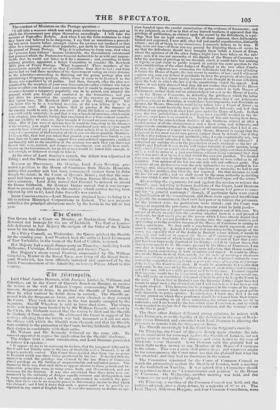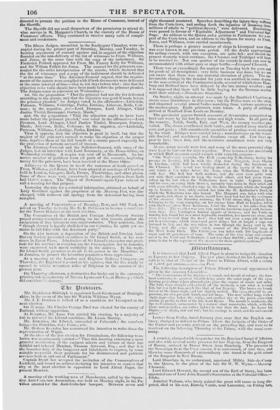tirbe Elfttv'opoolis.
Lord Chief Justice Denman, with Justices Littletlele, Williams, and Coleridge, sat in the Court of Queen's Bench on Monday, to receive the rennet to the writ of Habeas Corpus, commending Sir William Gossett, Sergeant-at-Arum, to produce the Sheriffs of London. and show by what warrant he holds them in custody. The Sheriffs ap- peared with the Sergeant-at-Arms, and were cheered as they entered the Court. They took their seats in the box usually occupied by the reporters. 'Sheriff Wheelton is said to have shed tears. The return to the writ having been hauded in by Sir William Gossett, and read by flue Clerk, Mr. Richards moved that the return be filed and the Sheriffs be dieeharged from custody. lie addressed the Court in support of his motion ; alleging that the return was bad, inasmuch as it did not state the offence with which the Sheriffs were charged, and that the Sheriffs were entitled to the protection of the Court, having J.:daintily discharged their duties in conformity with their oaths.
Mr. Watson and Mr. Kennedy nelowed on the saute side. No counsel appeared to Oppose the application for the Sheriffs' discharge. The Judges held a short consultation, and Lord Denman proceeded to deliver his opinion-
" It appears to me to be necessary to declare, that the judgment delivered by this Court last Trinity term in the case of Stoekdale cease: Hansard, is in all respects perfi-etly cot-rect. This Court there decided, that there ,.vas no power in Ellfuld which was above being questioned by the law. It decided that the manlier in which the privilepi was elainnal hy the late House of Commons placed privilege on the Motile,. of unquestionable and unlimited power. 'rlw argument there was, that such dicta as appear adverse to those general and in- conte:t 'tble principles were, in many cases, hasty nod ill-considered, and not neees,ary for the decision. It was also conselered that thine dicta were en- countered by the authority of Judges equally eminent and distinguished, mud numerous precedent;; and I, tiir one, endeavoured to est ablbdt the prim- Nile, that It, Can ur no despotic power in this country similar to ihat whirl' was claimed ; and 1 laid it down that such a power could not be possi!dy re- cognized its any court of English law. It was also necessary to declare an opi-
nion founded upon the careful examination of the evidence of documents; and in my judgment, as well as in that of my learned brothers, it appeared that the privilege of publication, as claimed upon the record by the defendants, is a pri- vilege that has no legal existence. To all those opinions, then deliberately formed and expressed, I now still, after full and careful consideration,distinctly adhere; and all of them, its my conscience, I sincerely believe to be true. If they were not true—if there was any ground for disputing them—it seems to me that the defendants should have brought them before a Court of Error, where the opinions of all the other Judges might have been taken on the sub- ject ; end, it' it was not unworthy of the dignity of the House of Commons to refer the question of privilege to our decision, surely it would have lost nothing in dignity or just claim to public respect to submit the same question to the calm consideration of the other Judges of England in the two other Courts. It; also, the judgment was erroneous, the defendants had the p over of taking it before the House of Lords, the last resort in matters of law : and I will never suppose any man can believe it justifiable to deny the propriety of obeying the judgment of this lest Court merely because it was thought fit to cast reflection urns the hods in which the law and the constitution vested the appeal. And besides, it was trimly observed that they did not confine this claim to the House
of C011111!011S. They expressly said that the power existed in both Houses of Parliament; so that there was an acknowledged interest in the House of Lords, as in the House of 00111111011S, in defending the privileges which the latter
sought to e-ita'Aisb. At the same time, let me observe, that if our judgments had been adv1rse to Stockdale, it would have been impossible, had Stockdale so pleased. for Messrs. Hansard to avoid being taken into a Court of Error ; so that the ease would inevitably have gone to another tribunal ; and had that
confirmed our judgment, it niu-t have gone to the House of' Lords. his that case, tl:e two jurisdictions, whiell had heen snort carefully avoided by the de- fendant,, must have ILTII resorted to. Nothing of this sort having been done, I regard so far the conscientious decision of my brethren, arrived at after a
careful review of all the circumstances, and a most calm, tout deliberate, and dispassionate consideration of the arguments and authorities, that I feel it en- titled to that degree of respect as to Justify -Messrs. Hansard in saying that the
judgment in the most recent case passed against them by default ; but if they felt tit st that judgment Was not juititiabl, why, I again emphatically ask, was not that judgment submitted to the con-ideation of a superior tribunal? I submitted my opinion then to the juriitlict ion of such tribunals as the law af- forded ; and Y submit it uew to the still higher tribunal of public opinion, being fully satisMel that no cundie lithel ran eo throurds the judgment then delivered, with a ei,h to errive at a just conclusion, without being convinced that that whish was arrived at by us was that which the occasion justified. We decided
that ease on our view of what the law seas, and which we were called on to ad-
minister. Our opinion of the liGV was our only safe and sufficient guide. The dscisions of our predecessors were the only authorities we were justified in fol-
lowing ; and, discarding arguments of expediency or necessity, we had to say what the law justified, and what the law required. On that occasion we took the law for our guide; and we shall resort to the same authority in deciding i the case which is now before its mu this writ of Habeas Corpus and the return."
After stating the erguments for and against the motion to release the Sheriff.. and referring to former decisions of the Court, Lord Denman came to the conclusion that the House of Commons had power to com-
mit for -a general contempt ;" though, if particular facts were stated in justification of the commitment, and these facts appeared insufficient to jnetify the commitment, the Court had power to release the prisoners. In the present case, no particulars were stated ; and the Court was bound to remand the prisoners; for the warrant must be held good- - The production of a good warrant 'slakes a complete end of this case. We are net at liberty to enter into the question whether there is a real ground of contempt, for that scull give es the power which I have already denied that we possess. We arc not justified in entering, into the supposed motives, and specoiating as to the probable reasons of the House of Commons in coming to such a conclusion. We tind such a conclusion distinctly expressed, and we must I: bound by it. Indeed, 1 thought that according to the language of the cases, and espLcially that of the .1 udim in Burdett versus Abbott, it would be rinses/el,/ a,ul eeheset sasieset Ii. Jens., et' Cements of suniressing any fads. tbe statement of which would tend to show a Court of Law that a sub- ject had 14'011 improperly deprived of his liberty ; and if in violent times this z21..11■■ti OW appeal- to be the course pursued bv the House of Commons, I ant Site that it would be a course which, upon ielketion, that House would ex- tremely regret, considering it both as unwise and unjust. It would be offen- sive to the flouse to think that, nwrely sfrite up'' omitting a disclosure such ttsu,ld girt. a snAj.d (loot, lit, II:otse had omitted stating the rea- sons tf his cononittal,iltsirLo to take a jp.or totrtntaye If,/ party, anti Wrong- fully to key thiu Court is thr dark. It would be monstrous to Gni4der that such could he the case under the adviec of men of great ability and learning; :old 1 e e one, will net readily pre:mine such to be the case. I cannot suppose that injustice would first be committed, and then that the House would say, s We will make an insufficient statement of filets its order to keep the Court in the dark.' I know that in Bushelrs case the Recorder Jeffries might have had reason to adopt such :t line of conduct, but I will not bdieve it has been or will be again adopted- This, however, has hem supposed in the course of the argu- ment; but 1 cannot think that such will ever be the comse of a great public body amenable to public opinion. In Conclusion, I must say, that I do not see any ground on which these gentlemen should be released 'from their impri- solineeit. According to nil thee,. authorities, the return seems to me to be sufficient ; and I am bound by the law, which alone I can look at, and by which I au required to declare that the return is :sufficient, and the warrant set out cm the face is good.'' The three other Judges delivered strolls. opinions' in unison with Lord Denman's, as to the legality of the decisions in the case of Stock- dale versus Mansard, and concurred with Lord Denman in allowing the prisoners to remain with the Seemant-at-Arms.
The Sheriffs accordingly left the Court in the Sergeant's custody.
On Thursday, the Court of Qu eel's male absolute the rule
for an ettachment tbr contempt oesime the Stu: rill's of Londoe, for not pre-illa over to Steel:dale the dameee end cost, levied in the case of Stoebelale reesue ilausard. Lord 1 Muntan said. the plaimiti had as much right to that tummy as any Member or the House of Commons to his estate. This was a mere civil proceedine ; and whatever might lie the consequences, the Court must see that the plaintiff had what the law- awarded ; and they had no discretion in the matter.
The tl'onunittee appointed by the Court of Common Council to watch the proceedings; against the Sheriffs of London, held a meeting at the Guildhall on Tuesday. It 'vets :u greed that a Committee should be appointed to draw up "a remonstrance and petition" to the House of Commons. On Wednesday, another meeting was held, and the " remonstreece and petition" adopted.
On Tilt:relay. a timeline, of the Common Council was held. and the
petition ad.,' fed, after a sharp debate, by a majority of 9 2 I. .r7 to Lord Mayor, Alderman Heygate, and four Common Councilmen, were
directed to present the petition to the House of Commons, instead of the Sheriffs.
The Sheriffs did not avail themselves of the permission to attend di- vine service in St. Margaret's Church, in the custody of the House of Commons' officers. They continued to receive many calls of compli- ment and condolence.



























 Previous page
Previous page